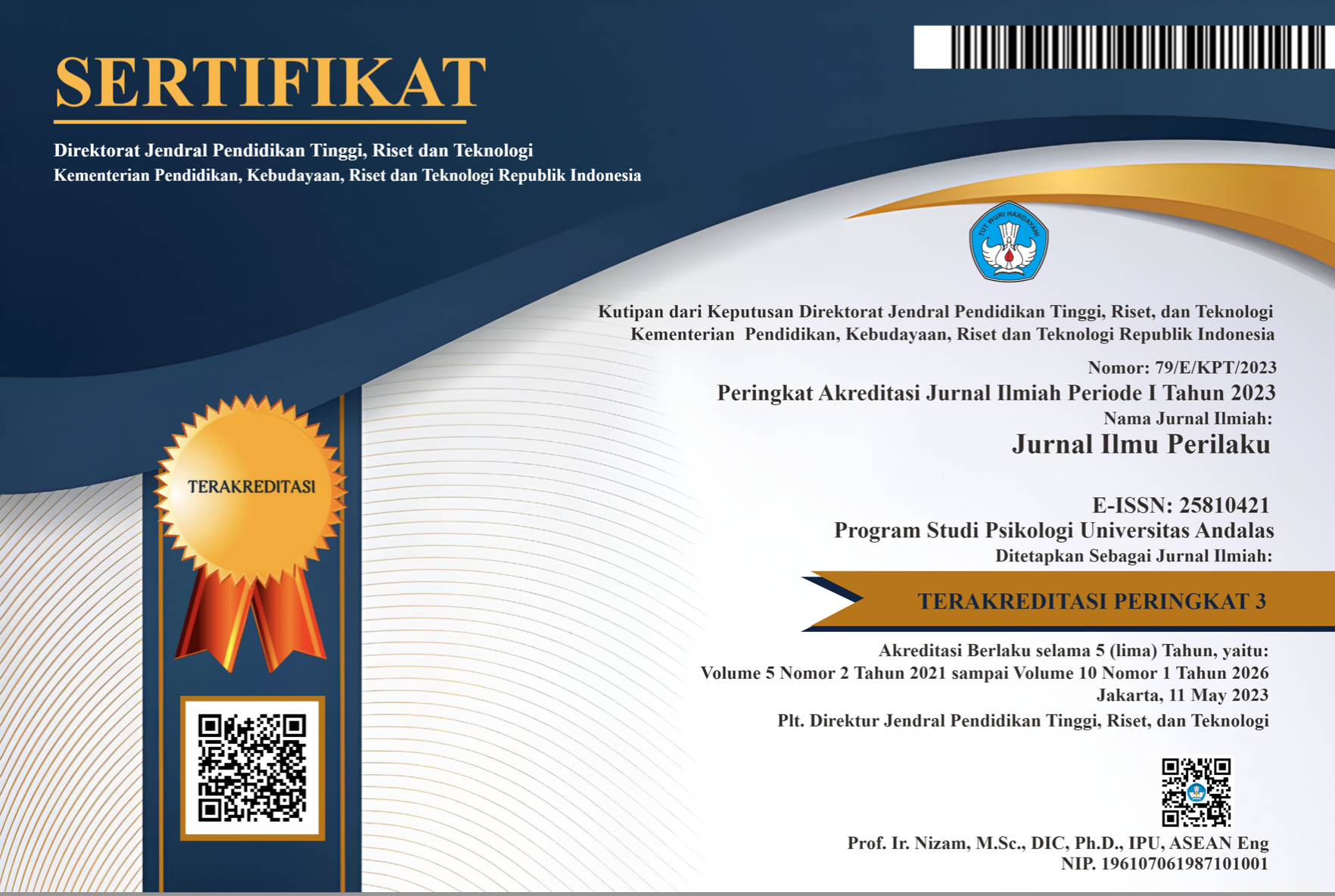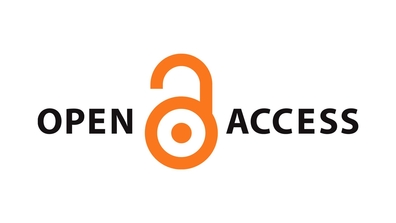Apakah Pemaafan Berkorelasi Dengan Psychological Well-Being Pada Remaja yang Tinggal Di Panti Asuhan?
Abstract
This study aimed to determine the corelation between forgiveness to psychological well-being in teenagers whose living in orphanages. Subject were obtained 172 adolescents who live in three orphanages in Pekanbaru by using purposive sampling technique that is 172. The Data were collected by using Psychological Well-being scale (Ryff) with reliability coefficient (0,885) and Thompson Heartland Forgiveness Scale (HFS) with reliability coefficient (0,839). The data analysis showed that there is a significant corelation between forgiveness and psychological well-being in teenagers whose living in the orphanages, with R= 0,790, and p = 0,000 (p≤0,05). When teenagers willing to forgive themselves, the situation and others people, it will make the teenagers able to establish a good relationships and able to give meaning for their experienced during life in orphanage which is corelate in perceiving psychological well-being. The low level of forgiveness is corelate with high psychological well-being. To improve the level of psychological well-being, teenegers must have to continue improving his or her own forgiveness, whether for forgiveness of self, others, or the situation.
Downloads
References
Arikunto, S. (2010). Manajemen Penelitian. Jakarta: Rineka Cipta.
Azwar, S. (2013). Penyusunan Skala Psikologi. Yogyakata: Pustaka Pelajar.
Azwar, S. (2007). Tes Prestasi: Fungsi dan Pengenbangan Pengukuran Prestasi Belajar. Yogyakarta: Pustaka Pelajar.
Azwar, S. (2013). Dasar-dasar Psikometri. Yogyakarta: Pustaka Pelajar.
Crain, W. (2007). Teori Perkembangan, Konsep dan Aplikasi. Yogyakarta: Pustaka Pelajar.
Ellison, C. G., & Levin, J. S. (1998). The Religion-Health Connection: Evidence, Theory, and Future Directions. Health Education and Behavior, Vol. 25, 700-720.
Faizal, M. (2012). Hubungan Antara dukungan sosial dengan penyesuaian diri remaja panti Asuhan.Skripsi. Fakultas Psikologi Uin Sultan Syarif Kasim Riau.
Hurlock, E. B. (1980). Penterjemah: Soejarwo, Sijabat. Psikologi Perkembangan: Suatu Pendekatan Sepanjang Rentang Kehidupan. Jakarta: Erlangga.
Jayanti, D. (2015) Kebahagiaan Pada Remaja Penghuni Panti Asuhan (Studi Kualitatif Defkriptif Pada Remaja Penghuni Panti Asuhan Al-Hidayah Di Pekanbaru). Skripsi Fakultas Psikologi Universitas Islam Negeri Sultan Syarif Kasim Riau.
Karremans, J. C., Lange, A. M., Ouwerkerk, J. W., & Kluwer, E. S. (2003). When Forgiving Enchances Psychological Well-being: The Role of Interpersonal Commitment. Journal of Personality and Social Psychology, 84, 1011-1026.
Levin, J. S., & Chatters, L. M, (1998). Religion, Health, and Psychological Well-being in Older Adults. Journal of Aging and Health, 10, 504-531.
Naqshbandi, M. M., Sehgal, R., & Hassan, F. U. (2012). Orphans in Orphanages of Kashmir “and their Psychological Problems”. International NGO Journal, Vol. 7, 55-63.
Notosoedirdjo, M., & Latipun. (2005). Kesehatan Mental: Konsep dan Penerapan. Malang: UMM Press.
Papalia, D. E., Olds, S. W., & Feldman, R. D. (2008). Human Development: Psikologi perkembangan Edisi kesembilan. Jakarta: Kencana Prenada Media Group.
Pilapil, A. C. D. (2015). Unfolding The Psychological Well-Being Of Orphans : A Qualitative Study Of Filipino Children In A Orphanage. International journal of Social Science and Humanities Research, Vol. 3, 404-415.
Raudatussalamah., & Susanti, R. (2014). Pemaafan (Forgiveness) Dan Psychological Wellbeing Pada Narapidana Wanita. Jurnal Fakultas Psikologi UIN Suska Riau. Vol.13, No.2, Hal. 219-234.
Ryan, R. M., & Deci, E. L. (2001). On Happines and Human Potentials: A Review of Research on Hedonic and Eudimonic Well-Being. Annu. Rev. Psychol, Vol. 52. 141-166
Ryff, C. D. (1989). Happiness is Everything, or Is It? Exploration on The Meaning of Psychological Well-being. Journal of personality and Social Psychology. 57, 1069-1081.
Ryff, C. D. (1995). Psychological Well-being in Adult Life. Current Directions in Psychological Science. Vol. 4, 99-104.
Ryff, C. D., & Keyes, C. (1995). The Structure of psychological wellbeing revisited. Journal of Personality and Social Psychology, 69, 719-727.
Ryff, C. D., & Singer, B. (1996). Psychological Well-being: Meaning, Measurement, and Implications for Psychoterapy Research. Psychotherapy and Psychosomatics. 65, 14-23.
Ryff, C. D., Magee, W. J., Kling, K. C,. & Wing, E. H. (1999). Forging Macro-Micro Linkages in The Study of Psychological Well-being. Dalam C.D. Ryff., & V.W. Marshall (Eds.), The Self and Society in Aging Processes (pp. 247–78). New York: Springer.
Sarafino, E. P., & Smith, T. W. (2011). Health Psychology: Bio Psychosocial Interactions. Seventh Editions.
Sengendo, J. & Nambi, J. (1997). The Psychological Effect of Orphanhood. A Study of Orphan is Rakai District. Health Transition Review, Suplement to Volume 7,105-124.
Swetting, H. & Hunt, K. (2014). Adolescent Socio-Economic and School-Based Social Status, Health and Well-Being. Social Science & Medicine, Vol. 121, 39-47.
Thompson, L. Y., Snyder, C. R., Hoffman, L., Michael, S. T., Rasmussen, H. N., Billings, L. S., Heinze, L., Neufeld, J. E., Shorey, H. S., Roberts, J. C., & Roberts, D. E. (2005). Dispotitional Forgiveness of Self, Others, and Situations. Journal of Personality. 73:2 . 314-359
Toussaint, L. & Webb, J. R. (2005). Theoretical and Empirical Connections between Forgiveness, Mental Health, and Well-being. Dalam E. L. Worthington, Jr. (Eds.),
Handbook of forgiveness (pp. 358). New York: Brunner-Routledge.
Vataliya, P. (2014). Psychological Well-being in Adolescence of Gender Difference. Research Paper, Vol.3

This work is licensed under a Creative Commons Attribution-NonCommercial-ShareAlike 4.0 International License.
The non-commercial use of the article is governed by the Creative Commons Attribution license as currently displayed on Creative Commons Attribution-NonCommercial-ShareAlike 4.0 International License.
JIP's spirit is to disseminate articles published are as free as possible. Under the Creative Commons license, JIP permits users to copy, distribute, display, and perform the work for non-commercial purposes only. Users will also need to attribute authors and JIP on distributing works in the journal.
Please find the rights and licenses in Jurnal Ilmu Perilaku (JIP).
- License
The non-commercial use of the article will be governed by the Creative Commons Attribution license as currently displayed on Creative Commons Attribution-NonCommercial-ShareAlike 4.0 International License.
- Author’s Warranties
The author warrants that the article is original, written by stated author(s), has not been published before, contains no unlawful statements, does not infringe the rights of others, is subject to copyright that is vested exclusively in the author and free of any third party rights, and that any necessary written permissions to quote from other sources have been obtained by the author(s).
- User Rights
JIP's spirit is to disseminate articles published are as free as possible. Under the Creative Commons license, JIP permits users to copy, distribute, display, and perform the work for non-commercial purposes only. Users will also need to attribute authors and JIP on distributing works in the journal.
- Rights of Authors
Authors retain the following rights:
- Copyright, and other proprietary rights relating to the article, such as patent rights,
- The right to use the substance of the article in future own works, including lectures and books,
- The right to reproduce the article for own purposes, provided the copies are not offered for sale,
- The right to self-archive the article.
- Co-Authorship
If the article was jointly prepared by other authors, the signatory of this form warrants that he/she has been authorized by all co-authors to sign this agreement on their behalf, and agrees to inform his/her co-authors of the terms of this agreement.
- Termination
This agreement can be terminated by the author or JIP upon two months’ notice where the other party has materially breached this agreement and failed to remedy such breach within a month of being given the terminating party’s notice requesting such breach to be remedied. No breach or violation of this agreement will cause this agreement or any license granted in it to terminate automatically or affect the definition of JIP.
- Royalties
This agreement entitles the author to no royalties or other fees. To such extent as legally permissible, the author waives his or her right to collect royalties relative to the article in respect of any use of the article by JIP or its sublicensee.
- Miscellaneous
JIP will publish the article (or have it published) in the journal if the article’s editorial process is successfully completed and JIP or its sublicensee has become obligated to have the article published. JIP may conform the article to a style of punctuation, spelling, capitalization, referencing and usage that it deems appropriate. The author acknowledges that the article may be published so that it will be publicly accessible and such access will be free of charge for the readers.










